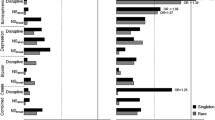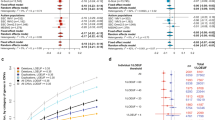Abstract
DUF1220 protein domains exhibit the greatest human lineage-specific copy number expansion of any protein-coding sequence in the genome, and variation in DUF1220 copy number has been linked to both brain size in humans and brain evolution among primates. Given these findings, we examined associations between DUF1220 subtypes CON1 and CON2 and cognitive aptitude. We identified a linear association between CON2 copy number and cognitive function in two independent populations of European descent. In North American males, an increase in CON2 copy number corresponded with an increase in WISC IQ (R 2 = 0.13, p = 0.02), which may be driven by males aged 6–11 (R 2 = 0.42, p = 0.003). We utilized ddPCR in a subset as a confirmatory measurement. This group had 26–33 copies of CON2 with a mean of 29, and each copy increase of CON2 was associated with a 3.3-point increase in WISC IQ (R 2 = 0.22, p = 0.045). In individuals from New Zealand, an increase in CON2 copy number was associated with an increase in math aptitude ability (R 2 = 0.10 p = 0.018). These were not confounded by brain size. To our knowledge, this is the first study to report a replicated association between copy number of a gene coding sequence and cognitive aptitude. Remarkably, dosage variations involving DUF1220 sequences have now been linked to human brain expansion, autism severity and cognitive aptitude, suggesting that such processes may be genetically and mechanistically inter-related. The findings presented here warrant expanded investigations in larger, well-characterized cohorts.


Similar content being viewed by others
References
Bagshaw ATM, Horwood LJ, Liu Y et al (2013) No effect of genome-wide copy number variation on measures of intelligence in a New Zealand birth cohort. PLoS One 8:e55208. doi:10.1371/journal.pone.0055208
Chabris CF, Hebert BM, Benjamin DJ et al (2012) Most reported genetic associations with general intelligence are probably false positives. Psychol Sci 23:1314–1323. doi:10.1177/0956797611435528
Courchesne E, Mouton PR, Calhoun ME et al (2011) Neuron number and size in prefrontal cortex of children with autism. JAMA 306:2001–2010. doi:10.1001/jama.2011.1638
Davis JM, Searles VB, Anderson N et al (2014) DUF1220 dosage is linearly associated with increasing severity of the three primary symptoms of autism. PLoS Genet 10:e1004241. doi:10.1371/journal.pgen.1004241
Devlin B, Daniels M, Roeder K (1997) The heritability of IQ. Nature 388:468–471. doi:10.1038/41319
Dumas LJ, O’Bleness MS, Davis JM et al (2012) DUF1220-domain copy number implicated in human brain-size pathology and evolution. Am J Hum Genet 91:444–454. doi:10.1016/j.ajhg.2012.07.016
Elley WB, Reid NA (1969) Progressive achievement tests: teacher manual: reading comprehension, reading vocabulary. New Zealand Council for Educational Research, Wellington
Fergusson DM, Horwood LJ (2001) The Christchurch Health and Development Study: review of findings on child and adolescent mental health. Aust NZ J Psychiatry 35:287–296
Haier RJ, Jung RE, Yeo RA et al (2005) The neuroanatomy of general intelligence: sex matters. NeuroImage 25:320–327. doi:10.1016/j.neuroimage.2004.11.019
Herculano-Houzel S (2009) The human brain in numbers: a linearly scaled-up primate brain. Front Hum Neurosci. doi:10.3389/neuro.09.031.2009
Hindson BJ, Ness KD, Masquelier DA et al (2011) High-throughput droplet digital PCR system for absolute quantitation of DNA copy number. Anal Chem 83:8604–8610. doi:10.1021/ac202028g
Jung RE, Haier RJ (2007) The Parieto-Frontal Integration Theory (P-FIT) of intelligence: converging neuroimaging evidence. Behav Brain Sci 30:135–154. doi:10.1017/S0140525X07001185
Keeney JG, Dumas L, Sikela JM (2014a) The case for DUF1220 domain dosage as a primary contributor to anthropoid brain expansion. Front Hum Neurosci 8:427. doi:10.3389/fnhum.2014.00427
Keeney JG, Davis JM, Siegenthaler J et al (2014b) DUF1220 protein domains drive proliferation in human neural stem cells and are associated with increased cortical volume in anthropoid primates. Brain Struct Funct. doi:10.1007/s00429-014-0814-9
O’Bleness M, Searles VB, Dickens CM et al (2014) Finished sequence and assembly of the DUF1220-rich 1q21 region using a haploid human genome. BMC Genom 15:387. doi:10.1186/1471-2164-15-387
O’Bleness MS, Dickens CM, Dumas LJ et al (2012) Evolutionary history and genome organization of DUF1220 protein domains. G3 (Bethesda) 2:977–986. doi:10.1534/g3.112.003061
Payton A (2009) The Impact of Genetic Research on our Understanding of Normal Cognitive Ageing: 1995 to 2009. Neuropsychol Rev 19:451–477. doi:10.1007/s11065-009-9116-z
Popesco MC, Maclaren EJ, Hopkins J et al (2006) Human lineage-specific amplification, selection, and neuronal expression of DUF1220 domains. Science 313:1304–1307. doi:10.1126/science.1127980
Rakic P (2000) Radial unit hypothesis of neocortical expansion. Novartis Found Symp 228:30–42 (discussion 42–52)
Raznahan A, Shaw P, Lalonde F et al (2011) How does your cortex grow? J Neurosci 31(19):7174–7177. doi:10.1523/JNEUROSCI.0054-11.2011
Reid NA, Huges DC (1974) Progressive Achievement Tests: Teachers Manual, Mathamatics. New Zeland Council for Educational Research, Wellington
Reid NA, Jackson PF, Gilmore A, Croft C (1981) Test of Scholastic Abilities. New Zeland Council for Educational Research, Wellington
Rietveld CA, Medland SE, Derringer J et al (2013) GWAS of 126,559 individuals identifies genetic variants associated with educational attainment. Science 340:1467–1471. doi:10.1126/science.1235488
Shaw P, Greenstein D, Lerch J et al (2006) Intellectual ability and cortical development in children and adolescents. Nature 440:676–679. doi:10.1038/nature04513
Supekar K, Swigart AG, Tenison C et al (2013) Neural predictors of individual differences in response to math tutoring in primary-grade school children. Proc Natl Acad Sci 110:8230–8235. doi:10.1073/pnas.1222154110
Trzaskowski M, Yang J, Visscher PM, Plomin R (2014) DNA evidence for strong genetic stability and increasing heritability of intelligence from age 7–12. Mol Psychiatry 19:380–384. doi:10.1038/mp.2012.191
Vandepoele K, Van Roy N, Staes K et al (2005) A novel gene family NBPF: intricate structure generated by gene duplications during primate evolution. Mol Biol Evol 22:2265–2274. doi:10.1093/molbev/msi222
Weschler D (1974) Manual for the Wechsler Intelligence Scale for Children - Revised. Psychological Corporation, New York
Acknowledgments
Funding for this work was provided by NIH R01 MH081203 (JMS), Colorado Clinical and Translational Science Institute TL1 TR001081 (VBS), and a Graduate Assistantship from the Coleman Institute for Cognitive Disabilities (JK). CHDS was funded by Grants from the Health Research Council of New Zealand, the National Child Health Research Foundation, the Canterbury Medical Research Foundation, the New Zealand Lottery Grants Board, the Marsden Fund, and the James Hume Bequest Fund. We thank Allison Miller for preparation of DNA samples.
Conflict of interest
JMS is founder and shareholder of GATC Science, LLC, a biotech company focused on genomics.
Author information
Authors and Affiliations
Corresponding author
Additional information
J. M. Davis and V. B. Searles contributed equally to this study.
Rights and permissions
About this article
Cite this article
Davis, J.M., Searles, V.B., Anderson, N. et al. DUF1220 copy number is linearly associated with increased cognitive function as measured by total IQ and mathematical aptitude scores. Hum Genet 134, 67–75 (2015). https://doi.org/10.1007/s00439-014-1489-2
Received:
Accepted:
Published:
Issue Date:
DOI: https://doi.org/10.1007/s00439-014-1489-2




